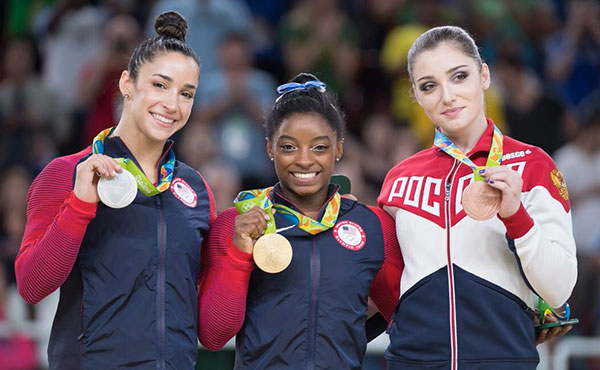
By Jo-Ann Barnas, Special Contributor
RIO DE JANEIRO — They held each other crying, rocking back and forth, their eyes glued to the scoreboard above them. Their work was over, one hit routine followed by another, and it didn’t matter if Simone Biles and Aly Raisman already had a feeling what the result was going to be. The two U.S. Olympic women’s gymnasts needed to see it up there for themselves, along with the more than 12,000 spectators who were already giving them a prolonged standing ovation at the Rio Olympic Arena.
- USA BILES Simone
- USA RAISMAN Alexandra
- RUS MUSTAFINA Aliya
The most dominant gymnast in the world the last three years, Biles can now call herself the Olympic all-around champion, while the teammate whom Biles calls her role model — that would be Raisman — collected silver, finally earning an Olympic medal in the event that eluded her four years ago.
“Right now, it still hasn’t hit me,” said Biles, 19, the three-time all-around World champion who became the first female all-arounder since Lilia Podkopayeva of Ukraine in 1996 to follow a World title with Olympic gold. “But it’s such an honor to be under that name (Olympic champion). It’s me now, and it doesn’t even feel real. I’m the same Simone; I just have two Olympic medals now.”
The one-two finish — Aliya Mustafina of Russia was the repeat bronze medalist — came two nights after Biles and Raisman, and Final Five teammates Gabby Douglas, Laurie Hernandez and Madison Kocian, earned the gold medal in the team final. Biles’ winning score Thursday night was 62.198, more than two points ahead of Raisman and nearly four over Mustafina.
“When I finished my floor routine, it felt like the whole entire arena was standing up and cheering and screaming,” said Raisman, 22. “And it was just so incredible because being in Brazil and not the USA, you don’t expect to get a standing ovation from the crowd. It was very emotional. This is the best atmosphere and the best arena I’ve ever been in.”
Biles’ gold was the fourth straight by a U.S. woman in the all-around at the Olympic Games, following Gabby Douglas (2012), Liukin (2008) and Carly Patterson (2004).
For the rest of the field, it must have seemed as if Biles’ coronation in Rio had begun days ago when she steamrolled through qualifying. But it actuality, it began way before that: Biles had entered the Olympics having won a record 10 golds (14 total) at the last three World Championships. If fact, she hasn’t lost a competition since before winning the first of her four consecutive U.S. titles at the P&G Championships in 2013.
After the medal ceremony, the leading question of the night was this: Is Biles the best female gymnast ever?
Martha Karoyli, USA Gymanstics’ outgoing national team women’s coordinator, thinks so. So does the Olympic team’s head coach, Aimee Boorman, who has been coaching Biles since she was six.
“I would put Simone now at the top,” said Karolyi, who is retiring after leading Team USA through five Olympic quads. “I think Simone is definitely number one. I will retire with a fantastic feeling. I will say, ‘Mission accomplished.'”
Asked if she considered Biles the best ever, Boorman said: “I think so. After winning three Worlds, everyone said she wouldn’t be considered the greatest until she won the Olympic all-around.”
Boorman paused for effect, before saying with a smile: “Mike drop!”
If there was a moment of uneasiness during the all-around competition, this being when Mustafina took a brief lead after the second rotation, the uneven bars — where Mustafina is the reigning Olympic champion — it sure wasn’t coming from Biles.
But let’s start at the beginning, the vault. Competing in the same rotation, Biles opened with 15.866 for her Amanar, followed by Raisman’s 15.633 while Mustafina scored 15.200. The Russian then took a slim lead of .034 after the next rotation when she hit a gorgeous routine (15.666) on bars. But Biles was fully aware that she couldn’t come close to matching Mustafina’s score as bars is her weakest event.
So when the all-around result after two rotations was shown, after Biles’ 14.966 revealed Mustafina in the top spot with Biles second, Seda Tutkhalian of Russian third and Raisman fourth, Boorman was unfazed.
Told after the medal ceremony that it had been the first time that Biles had been behind in a global all-around competition since 2013, Boorman said: “Yeah, but if the rotation was different, she wouldn’t have been behind at all. We gave her (Mustifina) that 15 minutes.”
Still, both gymnast and coach understood the importance of a clean routine by Biles on balance beam, meaning, no falls. The apparatus sat directly below a section filled with the Final Fivers — not to mention Bela Karolyi sitting next to his wife in their matching red outfits. Biles was the first of six gymnasts in the group to compete, Raisman the last.
Biles delivered in a big way, sticking a hit routine for a 15.433, while Mustafina struggled, scoring 13.866. When Raisman hit her routine — good for a 14.866 — she gave a thumbs-up to the crowd.
“When we hit beam – we were great on beam – floor is like a cakewalk for our girls,” Boorman said. “Mihai (Brestyan, Raisman’s coach) and I both said we weren’t nervous going into floor. Beam? We were a mess, and then when we got to floor we were, ‘Ok. Let’s play.'”
For Raisman, the defending Olympic champion on floor (she’s also the 2012 bronze medalist on beam), she found comfort and inspiration during her routine every time she saw Brestyan, the man who directed her comeback after the London Games. After the music stopped and she struck her finishing pose, Raisman covered her mouth with her hand and burst into tears.
Had she looked up into the stands at Martha Karolyi, she would have seen Karolyi crying, too.
The day was sweet redemption for Raisman, whose all-around medal more than made up for the one that she felt had been taken from her when she missed out on bronze in London when a tiebreaker on beam went against her, dropping her from a tie from third to fourth place, behind Mustafina.
“Sometimes mistakes are the best things for you,” Raisman said. “I think that happened in 2012 for a reason. I went in tonight knowing I was going to get the silver medal because I knew I was going to hit four for four.
“I went in into beam with a little bit of redemption; I made myself a little angry, and that’s the best way to do beam. You hit it really hard.”
That’s where the Final Five’s trademark moniker — “Break the beam” — comes from.
Boorman said she told Biles before going out on floor, for the final routine of the night, to “put on a show.”
“I told her to do it for yourself, and to do it for joy,” Boorman said. “I didn’t want her to even think about what she was having to do. I wanted her to let it flow.”
And flow it did. Smiling as she performed to a medley of Brazilian music, Biles seemed to soar higher than ever before with every beat. Her score: 15.933.
“My face keeps randomly leaking,” said Boorman later, adding that she doesn’t know if Biles plans to keep competing at the Rio Games are over.
As the Americans stood on the podium, silver and bronze around their necks, Biles said she was happiest for Raisman.
“I don’t think there’s anyone I’d rather share the podium with,” Biles said. “I’m more happy for her than I am (for) myself,”
Raisman said: “Simone did amazing tonight, as expected. I knew she was going to handle the pressure so well. We both kept smiling at each other all day. We kept on talking to each other, telling each other that we love each other.”
Silver and gold, gold and silver: A winning combination any way you write it.




